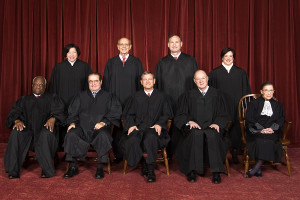The Fourth Amendment implications of living with a roommate [Updated]
The Supreme Court of the United States is currently revisiting the issue of co-tenant consent searches, deciding whether a carve-out to the general rule is warranted, or whether previous legal precedent should be abandoned.
Updated February 25, 2014: As anticipated, the opinion issued today in Fernandez v. California (pdf) may leave co-tenants a little uneasy. The Court held that Georgia v. Randolph does not extend to a case such as this one where the present co-tenant’s consent was obtained well after the objecting co-tenant had been removed from the residence. Cases have firmly established that police officers may search jointly occupied premises if one of the occupants consents. A narrow exception to this rule was articulated in Randolph, which held that the consent of one occupant is insufficient when another occupant is present and objects to the search. The Court emphasized that Randolph applies only when the objecting occupant is physically present. In this case, the defendant was not present when the consent was given. The Court rejected defendant’s arguments opining that “the lawful occupant of a house or apartment should have the right to invite the police to enter the dwelling and conduct a search. Any other rule would trample on the rights of the occupant who is willing to consent.”
In 2005, the Supreme Court of the United States held in Georgia v. Randolph that when two or more individuals are living together, one co-tenant cannot consent to a warrantless search of the joint residence if the other co-tenant is physically present and refuses the search. For instance, when a husband and wife are living together, the wife cannot consent to a warrantless search when her husband is present and refuses. The same rules apply to roommates or cohabiting couples. Although the Court has spoken on the issue of a co-tenant who is physically present and objecting, the decision in Randolph was narrow and did not address the fact situation that arose in the case of California v. Fernandez, argued before the Court in November 2013 and currently awaiting decision.
On October 12, 2009, Walter Fernandez was arrested at his residence in Los Angeles, California, after police were dispatched following the report of a robbery involving an assault with a deadly weapon. Because the police dispatcher indicated possible involvement by members of the Drifters gang, the responding officers drove to an alley where members of the gang often gathered. As they stood in the alley, two men walked by and one said, “[T]he guy is in the apartment.” Shortly thereafter, the policemen saw a man run through the alley and into the apartment where the witness had pointed. After calling for backup, the officers knocked on the door of the apartment from which they heard screaming.
Roxanne Rojas, Fernandez’s girlfriend, opened the door. Her face was red, she had a large bump on her nose that looked fresh, and there was blood on her shirt. Officers asked Rojas if anyone else was in the apartment, and she responded that only her son was inside. When officers asked her to step aside so they could conduct a sweep of the apartment, Fernandez stepped forward and stated “You don’t have any right to come in here. I know my rights.” He was subsequently taken into custody. After Fernandez was removed from the scene, officers secured the apartment. The officers informed Rojas that Fernandez had been identified as a robbery suspect, and asked for Rojas’s consent to search the apartment. Rojas gave her consent, both orally and in writing. After conducting a search, the officers recovered Drifters gang paraphernalia, a butterfly knife, boxing gloves, and clothing. However, none of the victims’ belongings were ever found.
Fernandez appealed his conviction to the state appellate court, contending that the trial court erred in denying his motion to suppress evidence seized during a warrantless search of his apartment.
A jury convicted Fernandez of second degree robbery and willful infliction of corporal injury on a spouse, cohabitant, or child’s parent. He was also convicted of using a deadly weapon, in the commission of the offense, at the direction of or in association with a criminal street gang. Fernandez pled no contest to possession of a firearm by a felon and possession of ammunition. For these crimes, the trial court sentenced him to serve a term of fourteen years. Fernandez appealed his conviction to the state appellate court, contending that the trial court erred in denying his motion to suppress evidence seized during the warrantless search of his apartment.

Supreme Court of the United States
On appeal, Fernandez’s defense attorney, citing Georgia v. Randolph, argued that Rojas’s consent to a search of the apartment was invalid because of Fernandez’s prior objection, making any evidence obtained inadmissible. The Attorney General disagreed, contending that Rojas’s consent provided a constitutionally permissible basis for the search once the defendant was lawfully removed from the apartment. The Court affirmed the decision of the trial court on that issue, holding that the police could lawfully conduct a warrantless search of the defendant’s apartment, notwithstanding the defendant’s objection, after the defendant had been lawfully arrested and was no longer present, and the defendant’s co-tenant had consented to a search of the shared residence.
After his conviction was affirmed, the defendant filed a petition for writ of certiorari with the Supreme Court of the United States, and the writ was granted. The question presented (pdf) on appeal is whether a defendant must be personally present and objecting when police officers ask a co-tenant for consent to conduct a warrantless search, or whether a defendant’s previously stated objection, while physically present, to a warrantless search is a continuing assertion of Fourth Amendment rights which cannot be overridden by a co-tenant.
“When the police arrive at a house in which multiple people live, they can assume, according to social custom, that if one person grants consent to enter, that person is speaking for everybody who lives in the dwelling. But when somebody is present and tells the police officer that he refuses consent, that presumption is reversed.”
At oral argument, counsel for Fernandez, Jeffrey L. Fisher, began his opening statement by discussing the doctrine of third-party consent. According to Fisher, there is a rebuttable presumption that “[w]hen the police arrive at a house in which multiple people live, they can assume, according to social custom, that if one person grants consent to enter, that person is speaking for everybody who lives in the dwelling.” However, “when somebody is present and tells the police officer that he refuses consent,” the presumption is rebutted. Therefore, according to Fisher, “when the police full well know that one person doesn’t have the delegated authority to speak for the others, they must respect the objection, and a failure to do so violates the Fourth Amendment.”
Shortly after his opening statement, Fisher was cut off with a long line of questions from the Justices. Justice Breyer commented that there may be a small window of opportunity for the police to speak with a co-tenant. He expressed concern for prohibiting the police to legally enter a residence in a situation such as this one where Rojas was willing to talk to the police and show them items in her own home. Fisher replied to Justice Breyer’s concerns, responding:
“There are two very easy ways for the police to deal with that…They can say…’get the things you’re worried about and bring them to us’…Alternatively, the police can say ‘Thanks for telling us. I’m glad you did. I want to help you. Your boyfriend has objected to us searching. Could you please step outside for fifteen minutes…we’ll call a judge and get a warrant and we’ll be inside in fifteen minutes. Meanwhile, we’ll protect you.’”
Although an opinion has not yet been issued, this case should alarm individuals living with a roommate, spouse, or significant other.
Louis Karlin, counsel for the State, argued that once the defendant was detained by police, the present co-tenant’s consent to search the premises should not be invalidated by an absent tenant’s prior objection. As Mr. Karlin stated, “[e]veryone knows that when they choose to live together and one person is absent the other has authority. That person has authority to admit visitors of her choice…and certainly to consent to a search of the shared premises.” Therefore, under the State’s theory, Ms. Rojas had the authority, as the sole present tenant, to admit visitors of her choice and to consent to a search.
During rebuttal, Mr. Fisher commented that adopting the other side’s position would reduce the decision in Randolph to nothing. The police could simply wait until the objecting co-tenant was no longer present, whether the co-tenant was forcibly removed or otherwise, to conduct a warrantless search.
Based on questions asked at oral argument, some of the Justices’ initial perceptions of the case were revealed. Justice Sotomayor appeared to be on the defense side, questioning why the police had not simply obtained a warrant. Some of the other Justices’ thoughts were harder to discern, but most appeared to side with the Government. Although an opinion has not yet been issued, this case should alarm individuals living with a roommate, spouse, or significant other. Many of us do not think about our Fourth Amendment rights before agreeing to live with someone, but perhaps we should, especially if the Court rules in favor of the State’s position.





